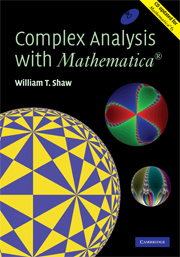Book contents
- Frontmatter
- Contents
- Preface
- 1 Why you need complex numbers
- 2 Complex algebra and geometry
- 3 Cubics, quartics and visualization of complex roots
- 4 Newton—Raphson iteration and complex fractals
- 5 A complex view of the real logistic map
- 6 The Mandelbrot set
- 7 Symmetric chaos in the complex plane
- 8 Complex functions
- 9 Sequences, series and power series
- 10 Complex differentiation
- 11 Paths and complex integration
- 12 Cauchy's theorem
- 13 Cauchy's integral formula and its remarkable consequences
- 14 Laurent series, zeroes, singularities and residues
- 15 Residue calculus: integration, summation and the argument principle
- 16 Conformal mapping I: simple mappings and Möbius transforms
- 17 Fourier transforms
- 18 Laplace transforms
- 19 Elementary applications to two-dimensional physics
- 20 Numerical transform techniques
- 21 Conformal mapping II: the Schwarz—Christoffel mapping
- 22 Tiling the Euclidean and hyperbolic planes
- 23 Physics in three and four dimensions I
- 24 Physics in three and four dimensions II
- Bibliograpy
- Index
10 - Complex differentiation
Published online by Cambridge University Press: 05 August 2014
- Frontmatter
- Contents
- Preface
- 1 Why you need complex numbers
- 2 Complex algebra and geometry
- 3 Cubics, quartics and visualization of complex roots
- 4 Newton—Raphson iteration and complex fractals
- 5 A complex view of the real logistic map
- 6 The Mandelbrot set
- 7 Symmetric chaos in the complex plane
- 8 Complex functions
- 9 Sequences, series and power series
- 10 Complex differentiation
- 11 Paths and complex integration
- 12 Cauchy's theorem
- 13 Cauchy's integral formula and its remarkable consequences
- 14 Laurent series, zeroes, singularities and residues
- 15 Residue calculus: integration, summation and the argument principle
- 16 Conformal mapping I: simple mappings and Möbius transforms
- 17 Fourier transforms
- 18 Laplace transforms
- 19 Elementary applications to two-dimensional physics
- 20 Numerical transform techniques
- 21 Conformal mapping II: the Schwarz—Christoffel mapping
- 22 Tiling the Euclidean and hyperbolic planes
- 23 Physics in three and four dimensions I
- 24 Physics in three and four dimensions II
- Bibliograpy
- Index
Summary
Introduction
In this chapter we introduce the concept of differentiation of a complex function of a complex variable. There are several ways of approaching this topic, and we shall consider at least two. Given that a complex number may be regarded as a pair of real numbers, we need to make very clear the distinction between differentiability of a function that has two real arguments and differentiability of a function with a single complex argument, and shall take as our starting point a review of the differentiation of functions of two real variables. This approach has the merit of generalizing in a straight-forward way to functions of many real or complex variables. We shall also consider another simple approach to differentiation based on the limit of a ratio. This latter approach is perhaps more familiar if you have taken a course in one-variable real calculus, but does not generalize to functions of several real or complex variables. A key result that we will establish is that a complex function is differentiable in the complex sense if (a) it is differentiable when considered as two real functions of two real variables and also (b) the Cauchy—Riemann equations (partial differential equations) apply. These equations link the real and imaginary parts of the function. After proving some basic results about complex differentiability, e.g., the product, quotient and chain rules, we then derive one of the principal results of basic complex analysis — that power series are differentiable within their radius of convergence.
Information
- Type
- Chapter
- Information
- Complex Analysis with MATHEMATICA® , pp. 208 - 236Publisher: Cambridge University PressPrint publication year: 2006
